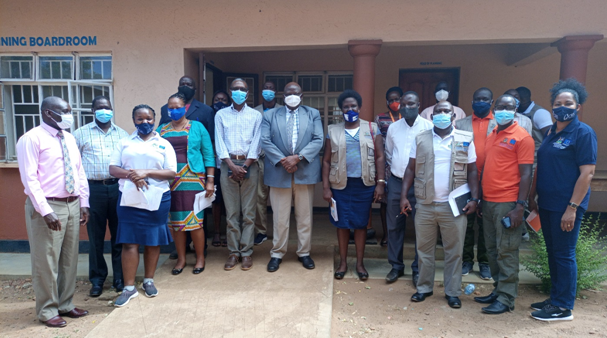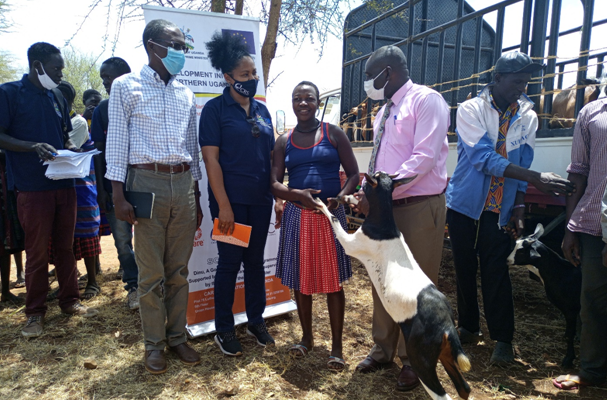The DINU programme Registers Milestones Amidst the Covid-19 Pandemic
- May 4, 2021
- Posted by: WebAdmin
- Category: News


“Through farming, I can provide for my husband and seven children. I have also completed a three-roomed house worth UGX 8,285,000. This money came from selling beans, cotton, and simsim totaling to UGX 8,600,000 to Gulu Agriculture Development Company (GADC) and one big bull worth UGX1,200,000.” Narrates fifty-seven-year Aryemo Margaret. Margaret is among the 1,229 “Inclusive Market-based Development for Smallholder Farmers in Northern Uganda in Kitgum District who garnered about 3.2bn from sesame and cotton sales between November and December 2020. Each farmer earned about UGX 2.4M from the sale of sesame and cotton through the Development Initiative for Northern Uganda (DINU) consortium partner GADC according to the report.
Margaret’s story and several others were shared with the CARE International in Uganda Country Director, Apollo Gabazira during a three-day visit to the DINU programme sites in Karamoja and Acholi sub-regions. Apollo expressed gratitude to all the stakeholders for their support that has enabled the “Inclusive Market-based Development for Smallholder Farmers in Northern Uganda” grant action to register milestones amidst the unprecedented COVID19 pandemic.
“DINU is a very complex action programme where the CARE International Consortium is implementing our biggest Livelihood component in 11 Districts. Unfortunately, this was complicated by the coming of COVID19. However, with your support and the District, partners, beneficiaries and the project staff on the ground, we have made incredible progress. I am hearing very good feedback about DINU”. Said Apollo.

Group photo at Moroto District Headquarters
Between 15th and 17th March 2021, he interacted with several leaders at the helm of DINU programme including the District Local Government officials, DINU Consortium partners, Office of the Prime Minister and project participants.
His message was consistent throughout his visit, revolving around three aspects which include; the configuration of the DINU program, partnership as a key lever for sustainability and the unique market approach in DINU.
“I am calling upon the people to learn from DINU’s market approach, where smallholder farmers go to the market without middlemen, and are able to trade. As CARE, the use of extension staff, is part of our sustainability framework because we also know that one-day CARE will leave and let Ugandans take care of themselves. I would like to thank the District Local Government leadership, without the district’s permission and support, DINU would not be here today”. Said Apollo.
While in Soroti, Apollo interacted with SORUDA’s Executive Director, Peter Ochepa Ekiru and handed him a copy of CARE’s new Business Plan that spells out CARE’s strategic direction for the next five years. Apollo said that “You are certainly one of our critical partners, and while I sign your contracts back in Kampala, it’s good to come and see what is on the ground. We are a values-driven organisation and issues of integrity are important to us. As a women and girls’ focused entity, we ask whether in everything you do, the women and girls facet come out”

The District Chairman, welcomes the CARE team to Katakawi District Local Government Headquarters
According to Alupo Scholar, the Katakawi District DINU focal person, about 362 groups have been formed and validated in the district and was optimistic about the outcome of the project. “The farmers are ready to plant using the modern agronomic practices. We shall plant in rows and manage our crops up to post harvest handling and sell in bulk because farmers are tired of middle men. This approach is unique and the first of its kind”. Reported Scholar.
The Katakawi District Chairman Elakas Walter Okiring appreciated the approach of involving extension workers which contributes to sustainability. “The beauty with this project is the involvement of government staff. When you involve government extension staff, then we are addressing the issue of sustainability and ownership.” Said Walter.
While in Moroto, Apollo and the delegation comprising of the District Local Government leaders, a team from Office of the Prime Minister and the Catholic relief Services (DINU partner in the district), visited two farmer groups.
“What we are going to see today is one of those examples of the support we need to focus on because it speaks for itself. The project is on track despite COVID19”. Said Johnson Owaro, the DINU Regional Programme Coordinator – Moroto Regional office.
The Moroto Chief Administrative Officer, Charles Kumakech stated the need for continuous building of synergies across the project and sustainability. He said; “I would like to thank CARE and the implementing team for being in touch with the local leadership. This is a very unique approach. For sustainability and ownership, the community should be able to own the project towards its end”.
The LCV Chairman Hon Keem Andrew Napaja shared the same sentiments about the DINU programme
“When we heard about DINU, we thought the programme is ‘muzungu’ led and they would bring their people but after the programme launch, we saw CARE was looking for African people; CRS and GADC staff, are Ugandans and we are very happy with what DINU has done. It has built the capacity of the people and as a District, we are going to supervise, advise our people and give you whatever it requires to implement the project”.
The delegation witnessed the handover of 120 improved Boer goats to 120 lead mothers out of the 612 expected to be distributed to Household Care Giver Groups for improving nutrition and household income in Rupa Sub-County Moroto District. DINU is working with 105 Farmer Groups and has formed 306 Household Care Giver Groups led by 133 Lead Mothers. Meanwhile, the delegation also visited the modern slaughter slab under construction within Rupa Market that will facilitate improved meat quality and generate revenue for the sub-county.
The Rupa Senior Assistant Secretary sub-county Chief, Okong Samuel said the needs are overwhelming but the resources of the district are not sufficient. “I want to thank CRS for coming in to support and fill some of these gaps. Most of our people depend on livestock hence the need to invest in natural resource rejuvenation and water catchment areas so that they don’t have to walk long distances”. Said Samuel.

The delegation witnesses the handover of improved goats to the lead mothers in Rupa Sub-county
The CRS Deputy Head of Programmes, Olive D’Mello also appreciated the sub-county leadership for the support rendered to the DINU programme She said; “It’s because of your support that we work with the extension workers and farmer groups. If you are not from this community, you need someone from Moroto to guide you. Rupa sub-county has put in a lot of effort towards the construction of the slaughter slab. They provided the space, identified the contractors, and this is what we desire as a programme. Not to do things for the community but to let the community take part.
Rupa sub-county’s population is estimated at 48,000 and majority of these people depend on livestock, unfortunately, uncertainty in the weather patterns remains challenging.
Apollo concluded his visit by meeting with farmer groups in Morulem sub-county, Abim District supported by SORUDA The groups have so far received training on production, Y/VSLA, and SRH/G.
While in Kitgum, GADC has built the capacity of the groups in basic agronomic practices and organic farming principles, postharvest handling, and marketing. The group has been certified through GADC in organic sesame production that meets the EU and other global market requirements.
Apollo advised the groups to take advantage of the programme and use it as a stepping stone to improve their livelihoods. He said; “As a women and girls focused organization, we want to see women change for the better; if women don’t change, then we won’t see sustainable change in community livelihoods. Ask yourself that by the time the project ends, will you be able to continue your progress towards improved livelihoods in your household? And if not bring questions to the team so they can help you address obstacles to sustaining the positive outcomes beyond the life of the project”.
The Development Initiative for Northern Uganda (DINU), a Government of Uganda Programme with support from European Union and supervised by the Office of the Prime Minister was awarded to CARE Denmark Consortium to implement an action “Inclusive Market-based Development for Smallholder Farmers for Northern Uganda”. The consortium is comprised of CARE International in Uganda (as an affiliate), Catholic Relief Services (CRS), Gulu Agricultural Development Company (GADC), Dynamic Agro-Pastoralist Development Organization (DADO) and SORUDA.
The three-year project aims to reach 68,250 direct beneficiaries (60% being women). The overall objective is to increase food security, improve maternal and child nutrition and enhance household income in the Karamoja Sub-region, Kitgum and Katakwi Districts. The districts include, Abim, Kotido, Karenga, Kaabong, Kitgum, Moroto, Amudat, Nakapiripirit, Nabilatuk, Napak, and Katakwi.

Physical Address:
5th Floor, Union House, Plot 78, Luthuli Avenue, Kampala.
Tel: +256 31 2258100
Thank you to all who supported us on this journey, including the untiring colleagues at CARE International in Uganda.


